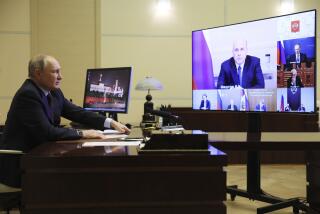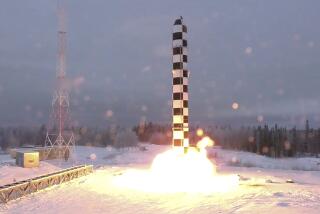India’s Stance on Nuclear Test Ban Treaty
- Share via
Your editorial of Aug. 19 blames India for its intransigence in blocking the nuclear test ban (CTBT) treaty. That is a simplistic analysis of the situation.
The historical lack of trust between India and its neighbors, particularly nuclear-armed China, compels India to not sign any asymmetrical treaty that forever freezes its inferiority vis-a-vis more heavily nuclear armed states, unless the same treaty requires the complete, even if gradual, destruction of all nuclear weapons. Given that the nuclear powers have shown no inclination whatsoever to give up such weapons, India cannot be expected to join this treaty.
This, however, is not the reason why India is blocking the current CTBT draft. The draft not only contains the aforementioned asymmetry but also states, in its entry-into-force (EIF) clause, that the treaty will come into force only on India’s ratification. The conference has also included provisions that may be used to compel India into agreeing to a treaty that it considers flawed. No wonder that India has, reluctantly, used its veto at the conference on disarmament.
The way out of this is a simple change in the EIF clause that does not make the treaty’s going into effect dependent on India’s ratification. However, it seems that some nuclear powers (viz., U.K., Russia and China) are using India’s long-held beliefs to get out of a treaty that they do not want but cannot come out and oppose, fearing international condemnation.
Finally, to show India’s re- sponsibility, one only needs to point out that of the approximately 2,000 nuclear tests held since Trinity in New Mexico, India has done only one test and none in the last 20 years.
ASEEM MEHTA
Pasadena
*
* Your editorial was fine, but before we criticize other nations for foot-dragging on nuclear test ban agreements, we should examine the new Republican Party platform. In the section “Restoring American World Leadership,” the plank referring to the threat of proliferation of weapons of mass destruction says, “This in turn will require the continuing maintenance and development of nuclear weapons and their periodic testing. The Clinton administration’s proposed Comprehensive Test Ban Treaty (CTBT) is inconsistent with American security interests.”
It is frightening to think that candidates running on this platform could soon be in charge of our arms policy.
SHIRLEY BLUMBERG
Mammoth Lakes
More to Read
Sign up for Essential California
The most important California stories and recommendations in your inbox every morning.
You may occasionally receive promotional content from the Los Angeles Times.













